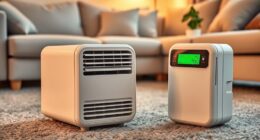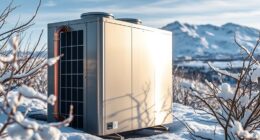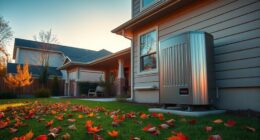Fed up with steep energy costs? We’ve got just the fix! In this article, we’re divulging our best strategies for maximizing heat pump efficiency.
From understanding efficiency ratings to smart thermostat integration, we’ve got you covered. By following these tips, you can slash your bills and enjoy the benefits of a more energy-efficient home.
Let’s get started on the path to savings and serving others by reducing our environmental impact.
Key Takeaways
- Understanding heat pump efficiency ratings such as EER and SEER helps in selecting an energy-efficient heat pump.
- Proper sizing and installation techniques, including accurate load calculations and professional installation, maximize heat pump efficiency and energy savings.
- Regular maintenance tasks like cleaning or replacing air filters, checking and cleaning coils, and scheduling professional check-ups ensure peak performance and identify potential issues.
- Adhering to a maintenance routine, including cleaning or replacing air filters, regularly inspecting and cleaning coils, and troubleshooting common issues, improves energy efficiency and prevents costly repairs.
Understanding Heat Pump Efficiency Ratings
We should start by understanding the efficiency ratings of heat pumps.

Heat pump performance is measured by a system’s energy efficiency ratio (EER) and seasonal energy efficiency ratio (SEER). EER measures the cooling capacity of a heat pump divided by its power consumption. The higher the EER, the more efficient the heat pump is at cooling.
SEER, on the other hand, measures the cooling output of a heat pump over an entire cooling season divided by the total electric energy input during the same period. It provides a more comprehensive picture of a heat pump’s efficiency.
Both EER and SEER are regulated by energy efficiency standards set by organizations like the U.S. Department of Energy. Understanding these efficiency ratings is crucial in selecting a heat pump that will provide optimal performance while saving energy and reducing utility bills.
Proper Sizing and Installation Techniques
To ensure optimal heat pump efficiency, it’s important to properly size and install the unit. Here are some key considerations for proper sizing and installation techniques:

-
Accurate load calculations: Properly sizing a heat pump requires accurate load calculations to ensure it can effectively heat or cool your space without being oversized or undersized.
-
Proper ductwork design: Well-designed ductwork is crucial for efficient heat distribution throughout your home. Ensure the ducts are properly sized, insulated, and sealed to minimize energy loss.
-
Appropriate refrigerant charge: Correct refrigerant charge is essential for optimal heat pump performance. Improper charge levels can lead to reduced efficiency and potential system damage.
-
Professional installation: It’s highly recommended to hire a professional HVAC contractor for the installation. They have the expertise to ensure proper equipment placement, electrical connections, and overall system functionality.
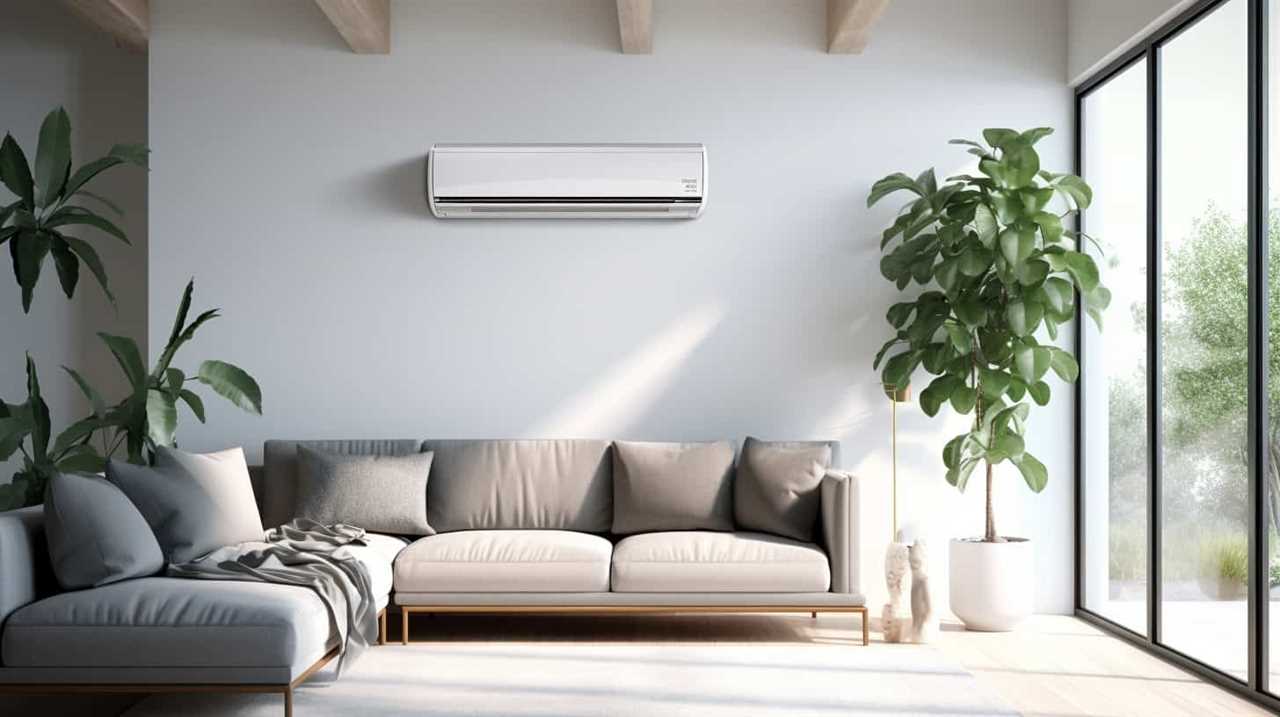
By following these proper sizing and installation techniques, you can maximize your heat pump’s efficiency and save energy in the long run.
Don’t forget to schedule regular maintenance to keep your system operating at its best.
Regular Maintenance for Peak Performance
Regular maintenance is crucial for ensuring optimal heat pump efficiency. By performing routine maintenance tasks such as cleaning or replacing air filters, checking and cleaning coils, and lubricating moving parts, homeowners can maximize the energy-saving potential of their heat pumps.
Additionally, scheduling professional check-ups at least once a year can help identify any potential issues and ensure that the heat pump operates at peak performance.
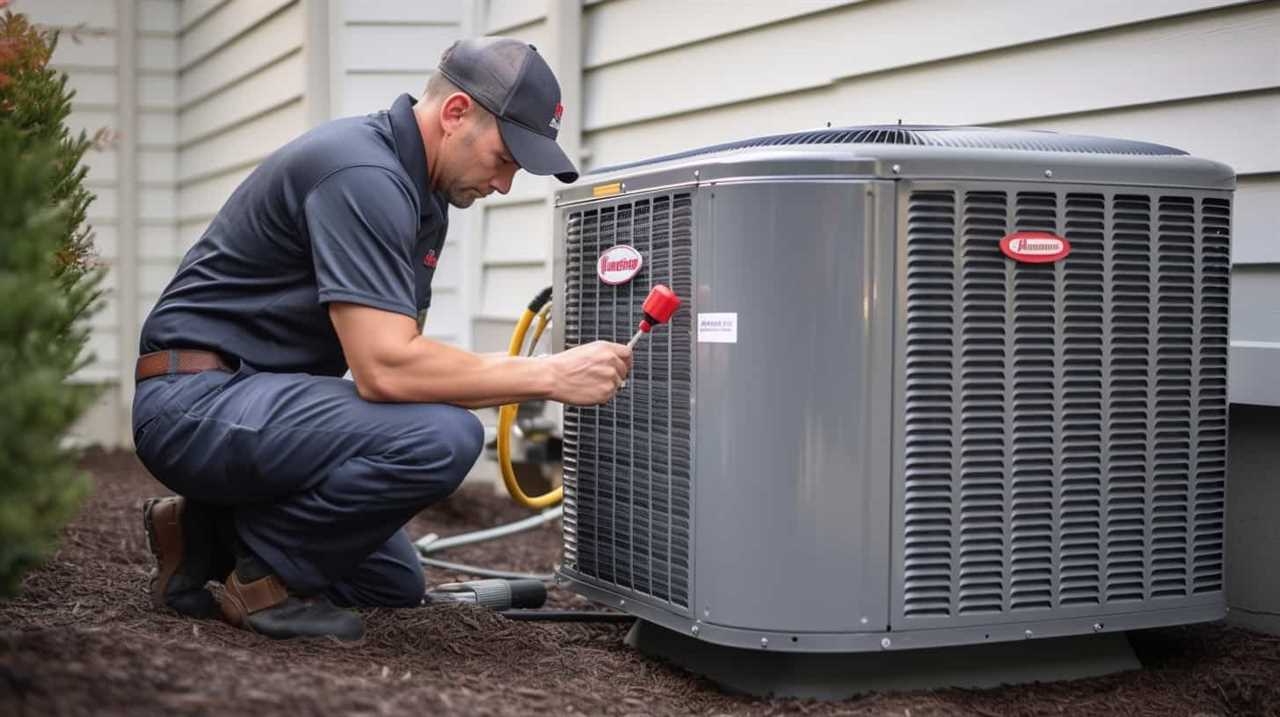
Importance of Maintenance
Regular maintenance is crucial for achieving optimal heat pump efficiency. To ensure your heat pump operates at peak performance, follow this maintenance checklist:
- Clean or replace air filters every 1-3 months to maintain airflow and prevent dust buildup.
- Check and clean the outdoor unit regularly to remove debris and ensure proper heat transfer.
- Inspect and clean the evaporator and condenser coils annually to maximize heat exchange efficiency.
- Schedule professional maintenance at least once a year to identify and address any potential issues.
By adhering to this maintenance routine, you can improve the energy efficiency of your heat pump and avoid costly repairs.
However, even with regular maintenance, issues may arise. If you encounter any problems, refer to these troubleshooting tips:
- Check the thermostat settings and ensure it’s set to the desired temperature.
- Verify that the circuit breaker for the heat pump isn’t tripped.
- Inspect the air filters for clogs or blockages.
- If the heat pump isn’t heating or cooling effectively, contact a professional for further diagnosis and repair.
Energy-Saving Maintenance Tips
By performing regular maintenance tasks, such as cleaning air filters and inspecting coils, we can ensure optimal heat pump efficiency.

To achieve energy-saving cleaning methods, start by cleaning or replacing the air filters every one to three months. Clogged or dirty filters restrict airflow, reducing the heat pump’s efficiency.
Inspect the coils regularly. If they’re covered in dirt or debris, use a soft brush or vacuum to clean them. This will allow the coils to transfer heat more effectively.
Troubleshooting common issues is also essential for maintaining peak performance. Check for any leaks in the ductwork and repair them promptly. Additionally, ensure that the thermostat settings are accurate and that the heat pump is operating in the correct mode for the season.
Following these maintenance tips will help maximize energy efficiency and keep your heat pump running smoothly.
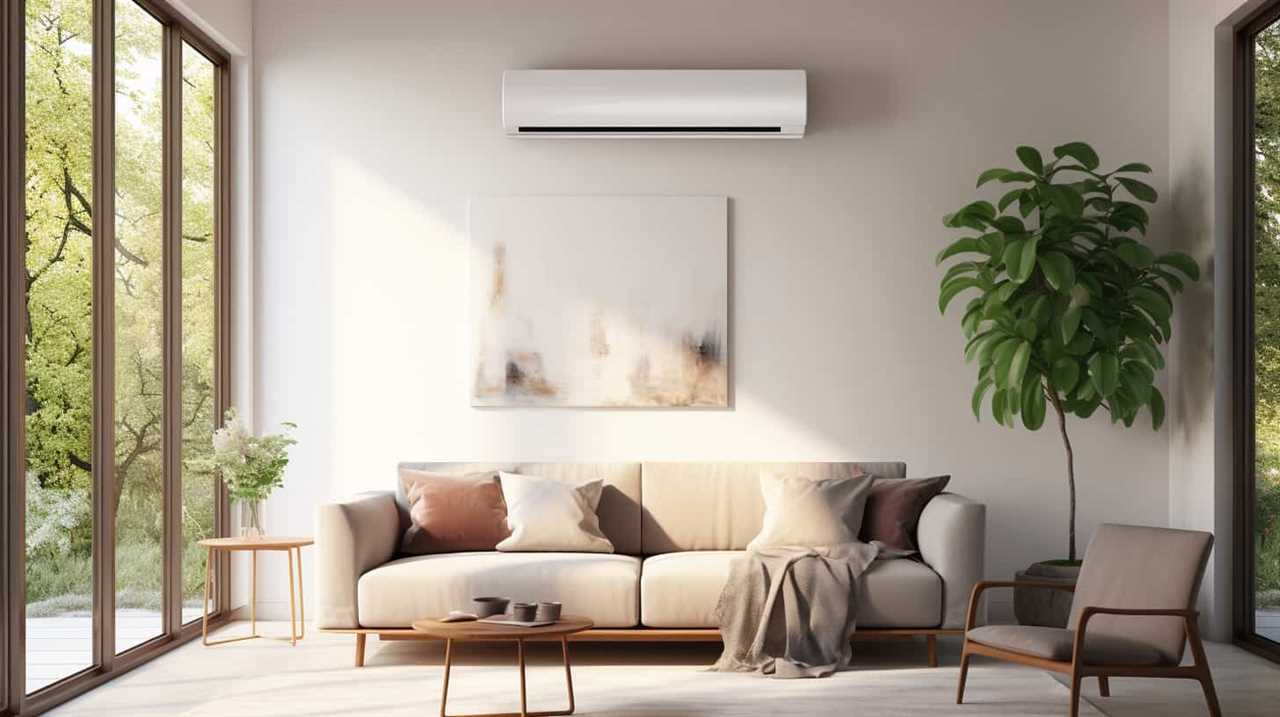
Schedule Professional Check-Ups
To ensure peak performance and optimal efficiency, we recommend scheduling professional check-ups for your heat pump on a regular basis. Regular professional maintenance is crucial for the long-term health and performance of your heat pump.
Here are some key reasons why annual servicing is essential:
- Preventive Maintenance: Regular check-ups allow professionals to identify and address any potential issues before they become major problems.
- Enhanced Efficiency: Professional maintenance ensures that your heat pump is operating at its highest efficiency, saving you money on energy bills.
- Extended Lifespan: By addressing any minor issues promptly and keeping your heat pump in optimal condition, you can extend its lifespan.
- Warranty Requirements: Many manufacturers require annual servicing to maintain the warranty on your heat pump.
Optimizing Heat Pump Settings for Efficiency
When it comes to optimizing heat pump settings for efficiency, there are two key points to consider: temperature control strategies and energy-saving programming tips.
By implementing temperature control strategies such as setting your heat pump to a comfortable but energy-efficient temperature, you can maximize efficiency.

Additionally, using energy-saving programming tips like scheduling temperature setbacks during periods of inactivity can further reduce energy consumption.
These points will be explored in more detail in the following sections.
Temperature Control Strategies
We can maximize our heat pump’s efficiency by implementing effective temperature control strategies. By carefully managing the temperature settings, we can optimize the performance of our heat pump and reduce energy consumption.
Here are some temperature control techniques and energy efficient heating strategies to consider:
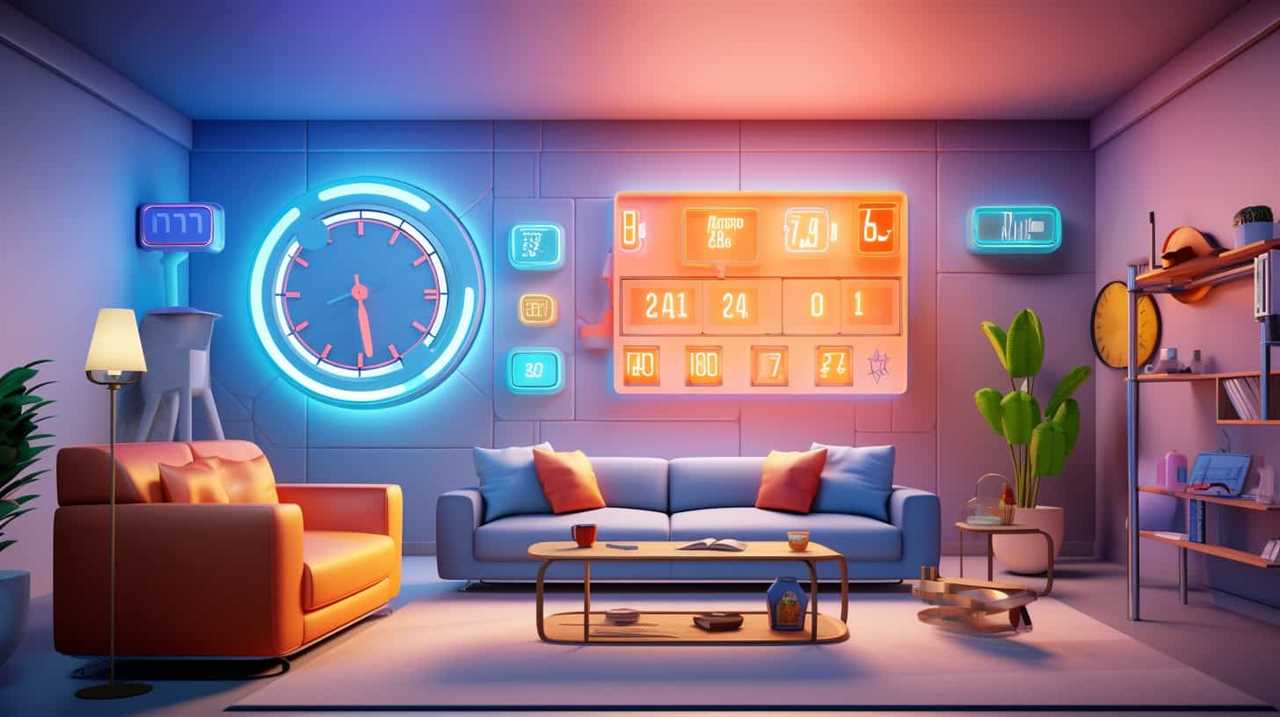
- Set the thermostat to the lowest comfortable temperature during the winter months.
- Use a programmable thermostat to automatically adjust the temperature based on your schedule.
- Take advantage of natural heat sources, such as sunlight, by opening curtains during the day.
- Use zoning systems to control the temperature in different areas of your home independently.
Implementing these strategies won’t only help you save on your energy bills but also contribute to a more sustainable and environmentally friendly home.
Energy-Saving Programming Tips
Our heat pump can operate with optimal efficiency by utilizing energy-saving programming tips. By implementing energy-saving scheduling techniques and thermostat programming strategies, we can maximize the efficiency of our heat pump and reduce energy consumption. Here are some programming tips to consider:
| Time | Temperature Setting | Activity |
|---|---|---|
| Morning | 68°F | Waking up and getting ready |
| Daytime | 65°F | Occupied but less active |
| Evening | 68°F | Cooking, relaxing, and socializing |
| Night | 62°F | Sleeping |
By adjusting the temperature settings based on our daily activities, we can avoid unnecessary heating or cooling when we are not actively using the space. This will result in significant energy savings over time. In the next section, we will discuss insulation and sealing strategies for additional energy savings.
Transitioning into the subsequent section about ‘insulation and sealing strategies for energy savings’, we can further enhance the efficiency of our heat pump by addressing any potential sources of heat loss or air leakage in our home.

Insulation and Sealing Strategies for Energy Savings
To maximize energy efficiency, it’s crucial to prioritize insulation and sealing in order to minimize heat loss and decrease utility bills. Proper insulation techniques and air leakage prevention play a significant role in maintaining a comfortable and energy-efficient home.
Here are some strategies to consider:
-
Insulate your walls and attic: Adding insulation to these areas can greatly reduce heat transfer and improve energy efficiency.
-
Seal air leaks: Identify and seal any gaps or cracks around windows, doors, and electrical outlets to prevent air leakage.

-
Use weatherstripping: Applying weatherstripping to doors and windows can help create a tight seal and prevent drafts.
-
Insulate ductwork: Insulating the ducts in your home can prevent heat loss during distribution, improving overall efficiency.
Smart Thermostat Integration for Enhanced Efficiency
By integrating a smart thermostat into your home heating system, you can enhance efficiency and reduce energy consumption. Smart thermostats offer a range of features that can help optimize your heat pump’s performance.
One of the key features is the ability to remotely control and monitor your thermostat from anywhere using a smartphone or tablet. This allows you to adjust the temperature settings based on your schedule, ensuring that your heat pump isn’t running unnecessarily when you’re away from home.

Additionally, smart thermostats often come with energy consumption monitoring capabilities. This feature allows you to track and analyze your energy usage patterns, enabling you to make informed decisions about how to further optimize your heat pump’s efficiency.
Frequently Asked Questions
Are There Any Government Rebates or Incentives Available for Installing a Heat Pump?
Yes, there are government rebates and incentives available for installing a heat pump. These incentives aim to promote energy efficiency and can help offset the cost of purchasing and installing a heat pump.
How Long Does a Heat Pump Typically Last Before Needing to Be Replaced?
On average, a heat pump typically lasts around 15-20 years before needing replacement. However, signs of heat pump failure, such as reduced efficiency or frequent breakdowns, may indicate the need for replacement sooner.
Can a Heat Pump Be Used to Heat a Swimming Pool or Hot Tub?
Yes, a heat pump can be used to heat a swimming pool or hot tub. It utilizes geothermal heating to efficiently warm the water, and also provides energy efficient cooling when needed.

What Is the Average Cost of Installing a Heat Pump?
The average cost of installing a heat pump varies depending on factors such as the size of the unit and the complexity of the installation process. It is important to consider these factors when budgeting for the installation.
Are There Any Special Considerations for Using a Heat Pump in Extremely Cold Climates?
In extremely cold climates, there are special considerations for using a heat pump. It is important to perform regular heat pump maintenance and winterize the system to ensure optimal efficiency and performance.
Conclusion
In conclusion, by implementing the tactics mentioned in this article, you can slash your bills and achieve optimal heat pump efficiency.
Understanding efficiency ratings, proper sizing and installation, regular maintenance, optimizing settings, and insulation strategies are all essential for energy savings.

Additionally, integrating a smart thermostat can further enhance efficiency.
Remember, a well-maintained heat pump is like a well-oiled machine, keeping your home comfortable while saving you money.
So, start implementing these strategies today and watch your energy bills plummet.






